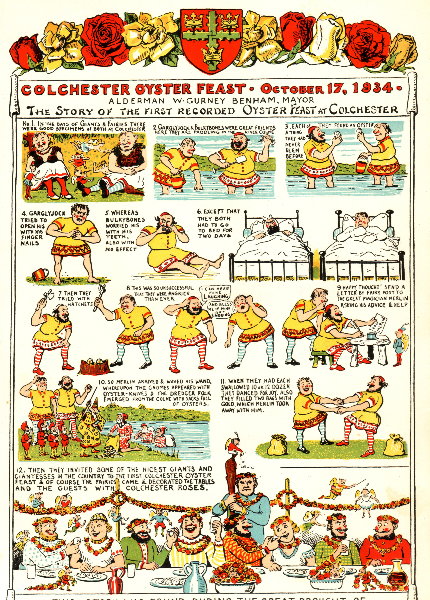

|
 Since a charter of 1189, the town of Colchester has controlled the oyster fisheries at the mouth of the river Blackwater, and Colchester Oysters, known as 'Colchester Natives', have been particularly prized. Oysters and Gin Image: http://www.camulos.com/oyster.htm  1934 Poster from www.camulos.com Every year, on the first Friday in September, the Mayor and his retinue begin the oyster season by travelling by boat to the Pyefleet Channel where a proclamation of 1256 is read out, the Mayor dredges up and eats the first oyster, followed by a loyal toast in gin and a piece of gingerbread. Colchester holds a civic Oyster Feast towards the end of October and an Oyster Festival at the beginning of June. Something called an 'Early day motion' was 'tabled' by some Westminster politicians in 2004 saying that; "That this House calls on the Government to support oyster growers in their application to the European Union to have protected geographical indication (PGI) issued to protect the name of the Colchester Native Oyster; believes that only oysters produced from the salt water creeks and estuaries of the historic Borough of Colchester should be allowed to be described as a Colchester Native; notes that oysters were farmed and harvested by the Romans from the same stretches of waters when Colchester was the first capital of Roman Britain; and believes that consumers who wish to eat the world's finest oysters should be protected from unscrupulous vendors who pass off inferior oysters as being Colchester Natives."  Original Receipt in 'The Country Housewife and Lady's Director' by Prof. R Bradley, 1728 (Bradley 1728) Original Receipt in 'The Country Housewife and Lady's Director' by Prof. R Bradley, 1728 (Bradley 1728)At this Season, Cyders, Mussels, Cockles, and such kind of Shell-Fish are good and in Season; as for the Oyster, it is not only to be eaten raw, but makes an agreeable Dish stew'd, or in Scallop-Shells; and besides, being useful in many Sauces, are extremely good when they are well pickled. Altho' the Oyster may seem foreign to a Farm, or some part of the Country, yet considering that we live in a part of the World surounded with a Sea that produces the best Oysters, and that they are a sort of Shell-Fish which we can keep a long time, and feed them, I think it necessary to take notice of them. About Colchester the Oyster-Pits are only small Holes about twelve foot square, by the side of the River, where the salt Water comes up, and has a passage into them at the height of the Tides; in these places the Oysters are laid, and there grow fat, and become green, by a sort of Weed which is called Crow-Silk: and this may be done any where, if there is a River with salt Water, as well as by Colchester, and be kept two or three Months; so that I wonder 'tis not practised in other places. But if we have not this conveniency, yet if we lay them in Salt and Water after the Shells are well wash'd, just when they come from the Sea, they will keep a Fortnight in pretty good order, if the Weather be cool, and they can have the open Air; but then the Salt and Water should be changed every four and twenty hours. The following Receipts are very good for preparing them for the Table.  Colchester Oyster Fayre Colchester Oyster Fayre |
|
MORE FROM Foods of England... Cookbooks ● Diary ● Index ● Magic Menu ● Random ● Really English? ● Timeline ● Donate ● English Service ● Food Map of England ● Lost Foods ● Accompaniments ● Biscuits ● Breads ● Cakes and Scones ● Cheeses ● Classic Meals ● Curry Dishes ● Dairy ● Drinks ● Egg Dishes ● Fish ● Fruit ● Fruits & Vegetables ● Game & Offal ● Meat & Meat Dishes ● Pastries and Pies ● Pot Meals ● Poultry ● Preserves & Jams ● Puddings & Sweets ● Sauces and Spicery ● Sausages ● Scones ● Soups ● Sweets and Toffee ● About ... ● Bookshop ● Email: editor@foodsofengland.co.uk COPYRIGHT and ALL RIGHTS RESERVED: © Glyn Hughes 2022 BUILT WITH WHIMBERRY |